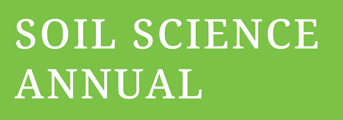PRACA ORYGINALNA
Topsoil organic carbon and soil pH across different peatland use types in Co-Offaly, Ireland
1
School of Food Science Environmental Health,, Technological University Dublin, Ireland
2
FOCAS Research Institute, Radiation and Environmental Science Centre, Technological University Dublin, Ireland
Zaznaczeni autorzy mieli równy wkład w przygotowanie tego artykułu
Data nadesłania: 05-08-2023
Data ostatniej rewizji: 30-12-2023
Data akceptacji: 07-02-2024
Data publikacji online: 07-02-2024
Data publikacji: 07-02-2024
Autor do korespondencji
Samuel Obeng Apori
School of Food Science Environmental Health,, Technological University Dublin, City Campus, Grangegorman, D07ADY7, Dublin, Ireland
School of Food Science Environmental Health,, Technological University Dublin, City Campus, Grangegorman, D07ADY7, Dublin, Ireland
Soil Sci. Ann., 2023, 74(4)183768
SŁOWA KLUCZOWE
DZIEDZINY
STRESZCZENIE
Land use changes in temperate peat soils significantly impact topsoil organic carbon (SOC) content and soil pH, with implications for ecosystem functioning and carbon storage. Therefore, assessing soil organic carbon (SOC) and pH is instructive for reducing global carbon emissions. In this study, peat soil samples were collected from 0-10 cm and 10-20 cm depths in Co-Offaly, Ireland, to examine the SOC and soil pH across various peatland use types, including grassland (improved and unimproved), forestry, industrial cutaway, and cutover bog. The results indicate that among the peatland use types, intensive grassland exhibited the lowest SOC content, likely due to intensive management practices such as grazing, fertilizer application, and ploughing. Additionally, the land use change significantly impacts the soil pH, with a trend in soil pH across the different land use types observed as improved grassland > unimproved grassland > industrial cutaway > forestry > cutover. A strong negative correlation was observed between SOC content and soil pH, indicating that increased soil pH levels are associated with decreased SOC in temperate peatlands. This research contributes valuable insights into the intricate interplay between land use, SOC, and soil pH, offering pertinent knowledge for strategies aimed at enhancing global carbon management efforts.
Przetwarzamy dane osobowe zbierane podczas odwiedzania serwisu. Realizacja funkcji pozyskiwania informacji o użytkownikach i ich zachowaniu odbywa się poprzez dobrowolnie wprowadzone w formularzach informacje oraz zapisywanie w urządzeniach końcowych plików cookies (tzw. ciasteczka). Dane, w tym pliki cookies, wykorzystywane są w celu realizacji usług, zapewnienia wygodnego korzystania ze strony oraz w celu monitorowania ruchu zgodnie z Polityką prywatności. Dane są także zbierane i przetwarzane przez narzędzie Google Analytics (więcej).
Możesz zmienić ustawienia cookies w swojej przeglądarce. Ograniczenie stosowania plików cookies w konfiguracji przeglądarki może wpłynąć na niektóre funkcjonalności dostępne na stronie.
Możesz zmienić ustawienia cookies w swojej przeglądarce. Ograniczenie stosowania plików cookies w konfiguracji przeglądarki może wpłynąć na niektóre funkcjonalności dostępne na stronie.

